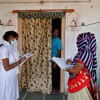BBS under fire, again

The Bangladesh Bureau of Statistics (BBS) is the body the government depends on for data on the various sectors of the economy to make policy decisions. Hence when that body fails to come up with sound data, it is the government, more than any other stakeholder that pays the price. Questions have been raised about its competence and this has been going on throughout the tenure of this government and not during just the current term in office. Indeed, a report in this paper going back as far back as June 2, 2010 states that the ministry of agriculture and its minister minced no words when she pointed out that the BBS had provided wrong data on Boro (a rice crop) production that led to problems for the ministry to effectively plan and execute crop planting in the country.
The minister had pointed out that the government had set the target of producing 1.90 crore tonnes from 48.50 hectares. That target was revised to 1.87 crore tonnes as there had been flooding that submerged some 50,000 acres of farmlands in the country's haor areas. The BBS was thrashed in a meeting in May since the body projected a production target of 1.74 crore tonnes with less than 50 percent of the Boro paddy harvested! Precisely how BBS came up with the magic number 1.74 crore is of course not known. Indeed, the problems didn't end there. BBS data showed low harvest figures for Aman (another rice crop), wheat and potato. With regards to potato production, the data showed 74 lakh (which turned out to be 85 lakh tonnes); Aman was shown as 1.22 crore tonnes as opposed to the real amount of 1.31 tonnes.
As we fast forward to 2012, we find that according to another report in this paper (published on December 20, 2012), the minister of finance was calling upon BBS to produce data that could be presented in a fashion which would make it understandable. The confusion in data presented was creating problems between the ministry of agriculture and ministry of food with regards to how much food the population would be consuming. One ministry was claiming self-sufficiency in food, whilst the other claiming otherwise, and the entire ruckus due to confusing data coming out of BBS. Indeed, the BBS stated in July, 2012 that the country had a population in excess of 15.25 crore, but that number was revised downward to 14.80 crore four months down the line. We would be very interested to know what happened to the suggestions that the finance minister had for BBS, i.e. the body work with the International Monetary Fund (IMF) and the World Bank to improve its calculation methods. Because apparently, the manner in which BBS was calculating the purchasing power parity (PPP) did not make much sense.
As per newspaper reports by national dailies on November 19, economists were clamouring for economic policies to be formulated on "credible" data. Now why is it that the BBS is continuously being hammered about the credibility of its data? At the launching ceremony of a new book authored by Policy Research Institute titled "Evidence-based Policy Making in Bangladesh", we are informed about the importance of research and evidence-based policymaking. What transpired from this meet is that the government has been found sorely lacking in developing in-house evidence-based policymaking capacity. Indeed, we are informed by Dr Mashiur Rahman, the prime minister's Economic Adviser, that policy making should not be based on populist notions. According to a report in a leading English daily on November 19, greater synthesising of various data sources and capacity building of relevant government agencies, including the BBS, was the need of the hour. The advisor minced no words on his take on the matter: "So, they may have studied anthropology, or Islamic history or Indian history or ancient European history. Same is the story with Bureau of Statistics."
Planning cadres can come from different fields of study since the service is deemed a generalist cadre, but we simply cannot have archaeologists, zoologists, linguists, etc. being recruited to serve in the BBS. This job is for statisticians, period. Yet, what we learn from our economic adviser is that one would be very lucky to find one in the BBS. When presented with such a scenario, one begins to comprehend how wrongly staffed the body is. The economic adviser has merely stated what has been uttered by many other former advisers and ministers and the message (no matter how caustic it may sound) remains the same—neither are we formulating evidence-based policies nor are we undertaking requisite steps to improve the capacities of the agencies implementing them. Unless we develop the capacity to analyse raw data, we can forget about making policies (in any field) that will make any sense. But for that to happen, we seriously need to recognise that we have a major problem with BBS on our hands and the body requires a major overhaul by recruiting the right person for the right job.
Syed Mansur Hashim is Assistant Editor, The Daily Star.

 For all latest news, follow The Daily Star's Google News channel.
For all latest news, follow The Daily Star's Google News channel. 








Comments